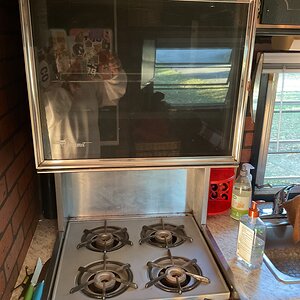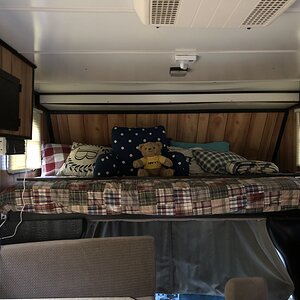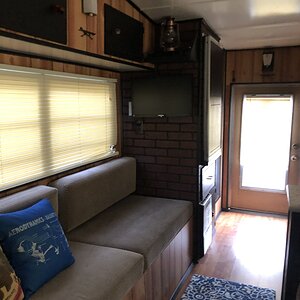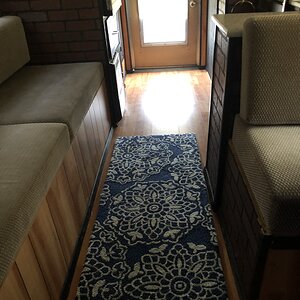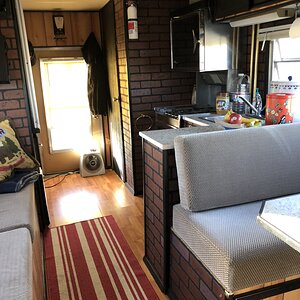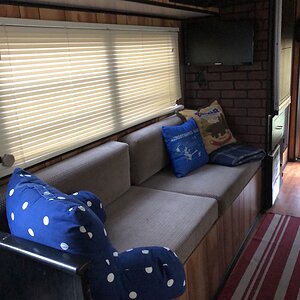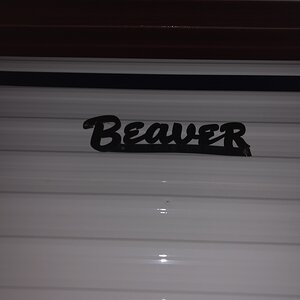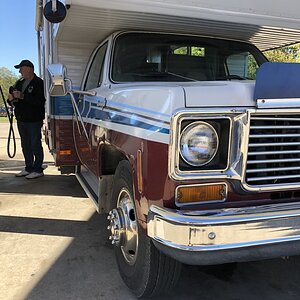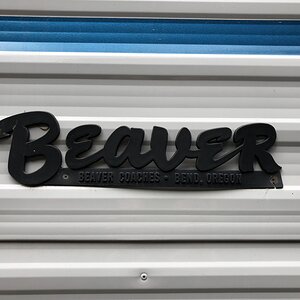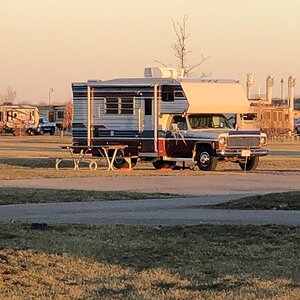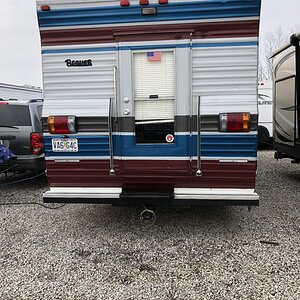Navigation
Install the app
How to install the app on iOS
Follow along with the video below to see how to install our site as a web app on your home screen.
Note: This feature may not be available in some browsers.
More options
Welcome to RVForums.com
- Register now and join the discussion
- Friendliest RV Community on the web
- Modern site for PC's, Phones, Tablets - no 3rd party apps required
- Ask questions, help others, review campgrounds
- Get the most out of the RV Lifestyle
- Invite everyone to RVForums.com and let's have fun
- Commercial/Vendors welcome
You are using an out of date browser. It may not display this or other websites correctly.
You should upgrade or use an alternative browser.
You should upgrade or use an alternative browser.
Towing Questions
- Thread starter DMan1717
- Start date
TJ&LadyDi
RVF "Dinosaur"
Welcome to RVF, @DMan1717; glad you've joined us here.
I'm not quite sure what a "5th wheel prep" by a dealer is. Does that mean the dealer installs a hitch, brake controller and electrical connection? If so, I would recommend buying the truck without it and having a qualified hitch shop install the best hitch they have.
IME, truck dealers are experts in selling trucks, not installing 5th wheel hitches. The hitch is a critical safety element and in the years when I was towing a good-size 5th wheel, I wanted a top-quality hitch, properly matched to my trailer and professionally installed by people who specialized in doing that. Even a great service shop mechanic at a car/truck dealership probably does not have much real-world experience in installing hitches. It is more than simply tightening up some bolts and running a few electrical wires. A good hitch shop installer can point you to the right hitch for your situation and give you some priceless pointers on best practices.
YMMV
TJ
I'm not quite sure what a "5th wheel prep" by a dealer is. Does that mean the dealer installs a hitch, brake controller and electrical connection? If so, I would recommend buying the truck without it and having a qualified hitch shop install the best hitch they have.
IME, truck dealers are experts in selling trucks, not installing 5th wheel hitches. The hitch is a critical safety element and in the years when I was towing a good-size 5th wheel, I wanted a top-quality hitch, properly matched to my trailer and professionally installed by people who specialized in doing that. Even a great service shop mechanic at a car/truck dealership probably does not have much real-world experience in installing hitches. It is more than simply tightening up some bolts and running a few electrical wires. A good hitch shop installer can point you to the right hitch for your situation and give you some priceless pointers on best practices.
YMMV
TJ
Kevin D Pem
RVF 1K Club
- Joined
- Jul 29, 2020
- Messages
- 3,956
- Location
- AZ
- RV Year
- 1984
- RV Make
- Alpinelite
- RV Length
- 26'
- TOW/TOAD
- 2016 Ram 1500
- Fulltimer
- Yes
TJ&LadyDi
RVF "Dinosaur"
Good point, Kevin. I could accept the dealership installing the trailer connection in the truck bed.I would have the electrical done by dealer and hitch done by a hitch pro. My reasons are I would not want to talk to FORD about electrical problems unless they caused them.
TJ
RAMmer-Jammer
RVF Regular
- Joined
- Dec 14, 2020
- Messages
- 11
- Location
- ID, USA
- RV Year
- 2021
- RV Make
- KZ
- RV Model
- D301RLT
- RV Length
- 34'-3"
- TOW/TOAD
- 2020 Ram 3500 SRW 4x4 HO TD Aisan Trans
- Fulltimer
- No
I am going to assume that the OP is referring to the factory 5th wheel prep package, which is the under-bed frame-mounted plate with the pucks for a removable puck-style 5th wheel hitch, as well as the inside-the-bed 7-pin trailer connector.
All of the big-three truck brands sell the prep packages for post-delivery installation.
The kit comes with a plug-and-play harness for the bed-mounted trailer plug, so no real "electrical work" is involved, just unplugging the place in the truck harness where the new pigtail goes, inserting the new harness, and plugging back together.
The drawbacks I see with this situation are these:
1. When built at the factory, a truck being equipped with the 5th wheel puck system would also be outfitted with the heavy duty towing package for that particular model of truck. One must verify what towing setup is on the truck they plan to have the 5th wheel prep package installed on to make sure it is ready for 5th wheel duty. If it already has the factory in-dash brake controller, and a 2-1/2" receiver hitch in back with a bumper-mounted 7-pin connector, it probably has all of the trans cooling and heavy duty radiator, etc.
2. When the factory installs the 5th wheel prep package, they install a bed that has the holes for the pucks already punched out prior to that bed being primed and painted, so those holes are properly treated to prevent rust. As an after-delivery installation, those holes have to be cut with a hole saw, leaving raw metal exposed on the edges of the holes. They get covered up with the plastic donuts that go in the holes, but they are still raw metal exposed underneath. The same applies to where they must hole-saw the place for the in-bed 7-pin receptacle. On a Ford with aluminum bed it may not matter a much as with a steel bed that can rust around those cutouts.
3. The bed has to be removed or unbolted and raised off the frame far enough to install the frame-mounted plate and brackets of the prep package. This is a risk (though not a big one) of the bed getting dinged or the back of the cab getting scratched by the bed movement. Some have to move back before up to avoid lower cab contact.
I studied all of this when truck shopping in 2020, and was considering doing my own "prep package" install if I couldn't find the right truck with a factory installation. I eventually found the right truck with everything I wanted already installed.
All of the big-three truck brands sell the prep packages for post-delivery installation.
The kit comes with a plug-and-play harness for the bed-mounted trailer plug, so no real "electrical work" is involved, just unplugging the place in the truck harness where the new pigtail goes, inserting the new harness, and plugging back together.
The drawbacks I see with this situation are these:
1. When built at the factory, a truck being equipped with the 5th wheel puck system would also be outfitted with the heavy duty towing package for that particular model of truck. One must verify what towing setup is on the truck they plan to have the 5th wheel prep package installed on to make sure it is ready for 5th wheel duty. If it already has the factory in-dash brake controller, and a 2-1/2" receiver hitch in back with a bumper-mounted 7-pin connector, it probably has all of the trans cooling and heavy duty radiator, etc.
2. When the factory installs the 5th wheel prep package, they install a bed that has the holes for the pucks already punched out prior to that bed being primed and painted, so those holes are properly treated to prevent rust. As an after-delivery installation, those holes have to be cut with a hole saw, leaving raw metal exposed on the edges of the holes. They get covered up with the plastic donuts that go in the holes, but they are still raw metal exposed underneath. The same applies to where they must hole-saw the place for the in-bed 7-pin receptacle. On a Ford with aluminum bed it may not matter a much as with a steel bed that can rust around those cutouts.
3. The bed has to be removed or unbolted and raised off the frame far enough to install the frame-mounted plate and brackets of the prep package. This is a risk (though not a big one) of the bed getting dinged or the back of the cab getting scratched by the bed movement. Some have to move back before up to avoid lower cab contact.
I studied all of this when truck shopping in 2020, and was considering doing my own "prep package" install if I couldn't find the right truck with a factory installation. I eventually found the right truck with everything I wanted already installed.
Last edited:
TJ&LadyDi
RVF "Dinosaur"
Thanks for that information. It has been a while since we towed a 5th wheel or bought a truck to do so. If that’s the “prep package” the OP is talking about, then it sounds like it might be a good option. A good hitch shop, however, will do pretty much the same thing (though, as you point out, it may require some disassembly) and they can tailor their “prep” to the specific hitch you will be using.I am going to assume that the OP is referring to the factory 5th wheel prep package, which is the under-bed frame-mounted plate with the pucks for a removable puck-style 5th wheel hitch, as well as the inside-the-bed 7-pin trailer connector.
All of the big-three truck brands sell the prep packages for post-delivery installation.
The kit comes with a plug-and-play harness for the bed-mounted trailer plug, so no real "electrical work" is involved, just unplugging the place in the truck harness where the new pigtail goes, inserting the new harness, and plugging back together.
The drawbacks I see with this situation are these:
1. When built at the factory, a truck being equipped with the 5th wheel puck system would also be outfitted with the heavy duty towing package for that particular model of truck. One must verify what towing setup is on the truck they plan to have the 5th wheel prep package installed on to make sure it is ready for 5th wheel duty. If it already has the factory in-dash brake controller, and a 2-1/2" receiver hitch in back with a bumper-mounted 7-pin connector, it probably has all of the trans cooling and heavy duty radiator, etc.
2. When the factory installs the 5th wheel prep package, they install a bed that has the holes for the pucks already punched out prior to that bed being primed and painted, so those holes are properly treated to prevent rust. As an after-delivery installation, those holes have to be cut with a hole saw, leaving raw metal exposed on the edges of the holes. They get covered up with the plastic donuts that go in the holes, but they are still raw metal exposed underneath. The same applies to where they must hole-saw the place for the in-bed 7-pin receptacle. On a Ford with aluminum bed it may not matter a much as with a steel bed that can rust around those cutouts.
3. The bed has to be removed or unbolted and raised off the frame far enough to install the frame-mounted plate and brackets of the prep package. This is a risk (though not a big one) of the bed getting dinged or the back of the cab getting scratched by the bed movement. Some have to move back before up to avoid lower cab contact.
I studied all of this when truck shopping in 2020, and was considering doing my own "prep package" install if I couldn't find the right truck with a factory installation. I eventually found the right truck with everything I wanted already installed.
TJ
Lee Walton
RVF Newbee
- Joined
- Feb 15, 2021
- Messages
- 4
- Location
- Dickinson, Texas
- RV Year
- 2018
- RV Make
- Voltage
- RV Model
- 3005
- RV Length
- 35ft.
- TOW/TOAD
- 2012 Ram 3500 DRW 4x4
No way in hell I would let the car dealer install that stuff. For 1 they will charge too much. Second, not sure they know what they are doing.In the market for a Ford 250 or 350. If the dealer wants to add the 5th wheel prep as an aftermarket item. Is that as good as the factory 5th wheel prep?
Similar threads
- Replies
- 10
- Views
- 1K
Latest resources
-
Trueline Leveling System (Valid Air)Operation & Service Manuals for the Valid Air leveling system
- Jim
- Updated:
-
-
Notes on the Electrical Systems of the Roadtrek Zion Family of RVsNotes on the Electrical Systems of the Roadtrek Zion Family of RVs
- dilbertjth
- Updated:
-
-

